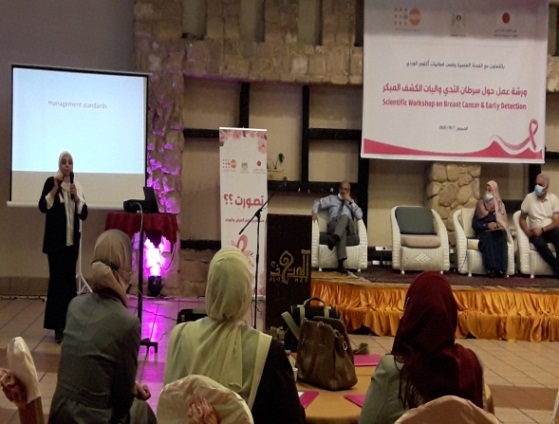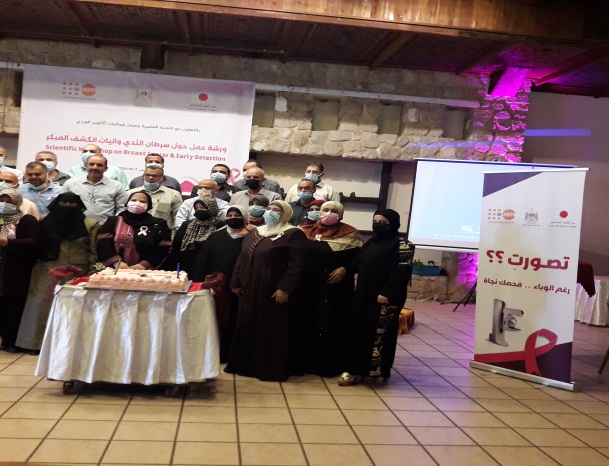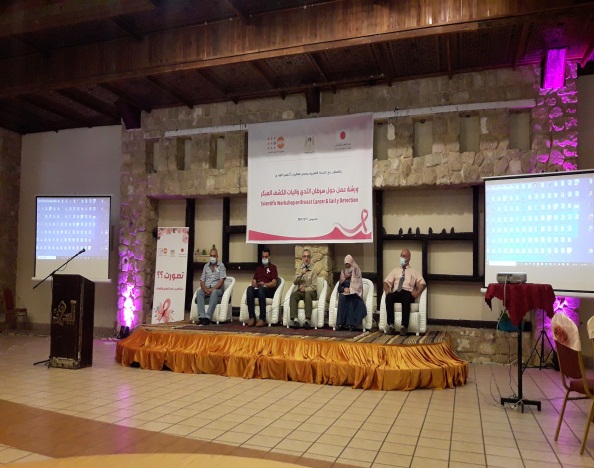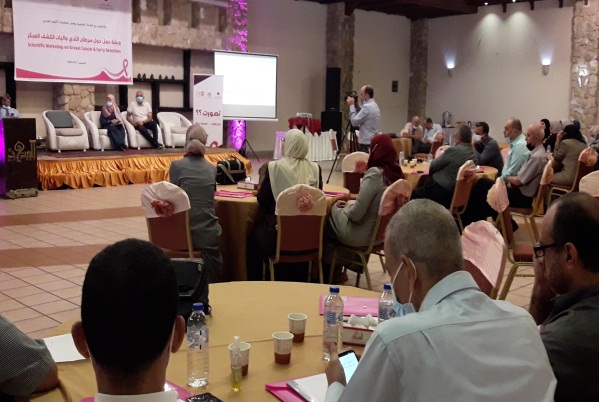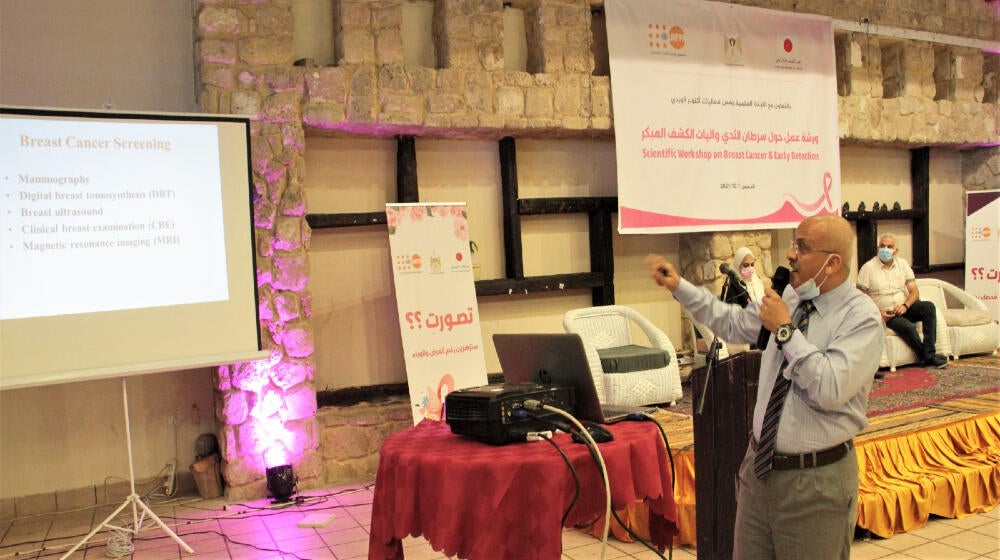7 October 2021, Gaza Strip, Palestine: UNFPA in cooperation with The Scientic Committee organized a one-day scientific workshop on breast cancer and early detection which took place to present 6 scientific papers. It was was attended by 50 health care providers (doctors, laboratory specialists, pharmacists, x-ray specialists).
Highlights on most important points raised through scientific papers:
- Mammography is the only breast imaging examination that has been shown to reduce breast cancer mortality. Population-based sensitivity is 75% to 80%, but sensitivity in high-risk women with dense breasts is only in the range of 50%. Breast ultrasound and contrast-enhanced breast MRI have become additional standard modalities used in the diagnosis of breast cancer.
- In high-risk women, ultrasound is known to detect approximately four additional cancers per 1,000 women. MRI is exquisitely sensitive for the detection of breast cancer. In high-risk women, it finds an additional four to five cancers per 100 women.
- Many new breast imaging tools have improved and are being developed to improve on current ability to diagnose early-stage breast cancer.
- Breast cancer is typically detected either during screening, before symptoms have developed, or after a woman notices a lump. Most masses seen on a mammogram and most breast lumps turn out to be benign (not cancerous). When cancer is suspected, tissue for microscopic analysis is usually obtained from a needle biopsy (fine-needle or larger core-needle) and less often from a surgical biopsy. Selection of the type of biopsy is based on multiple factors, including the size and location of the mass, as well as patient factors and preferences and resources.
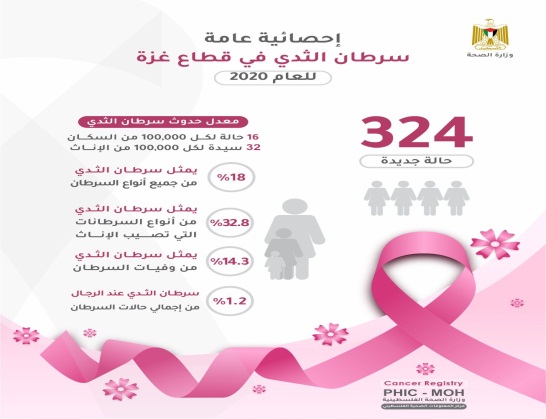
According to the SEER summary stage system:
- In situ stage refers to the presence of abnormal cells that are confined to the layer of cells where they originated.
- Local stage refers to invasive cancer that is confined to the breast.
- Regional stage refers to cancer that has spread to surrounding tissue and/or nearby lymph nodes.
- Distant stage refers to cancer that has spread to distant organs and/or lymph nodes, including nodes above the collarbone
Breast Cancer Screening all around the World:
- The recommendations below are for women at average risk of breast cancer (i.e., women without a personal history of breast cancer, a suspected or confirmed pathogenic genetic variation [e.g., BRCA1 or BRCA2], a strong family history, or a history of previous radiotherapy to the chest at a young age). All women should become familiar with the potential benefits, limitations, and harms associated with breast cancer screening.
- Women should have the opportunity to begin annual screening between the ages of 40 and 44.
- Women ages 45 to 54 should be screened annually.
- Women ages 55 and older should transition to biennial screening or have the opportunity to continue screening annually.
- Women should continue screening mammography as long as their overall health is good and they have a life expectancy of 10 years or more
Early detection & screening of breast cancer
- The main objective of any screening program is to reduce the burden of a disease by detecting it in an early stage where an effective treatment enhances the chance of survival
- Early detection is the key in improving outcomes from breast cancer when its curable & there are better management choices, better prognosis ensuring better quality of life for women & of course decrease breast cancer mortality rates.
Early detection of breast cancer includes:
• Breast self-examination: the initial tool of early detection of breast cancer, starting from 20-25 years every month , every woman should know how her breasts normally look and feel and be able to recognize any changes in the future.
• Breast clinical examination: should start at the age of 20-25 , examination by trained health care professionals and supposed to be part of a woman’s routine check-up visits for instance women seeking antenatal care, postnatal care, and family planning services
- Mammogram: which is X-ray imaging of the breast, it is the gold standard and the worldwide proven method in finding cancer breast early, from 40 years to 70 years to average risk women from 35 years to high risk women recently digital mammography was used as an alternative to film mammography, it's better as it needs lower doses of radiation
- The machine takes x-rays at lower doses than usual x-rays. Because these x-rays don’t go through tissue easily, the machine has 2 plates that compress or flatten the breast to spread the tissue apart.
This gives a better picture and allows less radiation to be used
- Ultrasound: usually used as a complementary imaging technique to mammography, never an initial imaging screening method
- Magnetic resonance imaging (MRI): HR
Scientific workshop on the occasion of Breast Cancer Awareness Month 2021
الخميس 7-10-2021
|
المتحدث |
التوقيت |
الموضوع |
|
|
9:00 – 8:30 |
تسجيل حضور |
|
د. فواز أبو زيادة |
9:10-9:00 |
افتتاح وترحيب وكلمة اللجنة العلمية |
|
9:20 -9:10 |
كلمة صندوق الأمم المتحدة للسكان UNFPA |
|
د. ماهر شامية |
9:30 – 9:20 |
كلمة مدير عام الرعاية الأولية |
|
الجلسة الأولى – رئيس الجلسة – د. سميحة شاكر |
||
|
د. زكي الزقزوق |
9:40 -9:20 |
Breast Cancer definition and geographical distribution |
|
د. فاطمة شراب |
10:00 – 9:40 |
Imaging Technologies in Breast Cancer Detection |
|
د. احمد الناجي |
10:20 – 10:00 |
Breast Cancer Updates &Trends |
|
10:20- 10:40 استراحــــــة لمدة 20 دقيقة |
||
|
الجلسة الثانية – رئيس الجلسة د. رامي العبادلة |
||
|
د. رامي العبادلة |
12:00 – 11:40 |
Breast Cancer patients and survivors and COVID19 |
|
د. عايدة حلس |
12:20 – 12:00 |
Screening program in PHC |
|
د. فواز أبو زيادة |
12:40 – 12:20 |
Breast Cancer and Social Acceptance |
|
ا. مها فضل |
1:30 - 12:40 |
نقاش مفتوح و أهم التوصيات واختتام اليوم العلمي |
